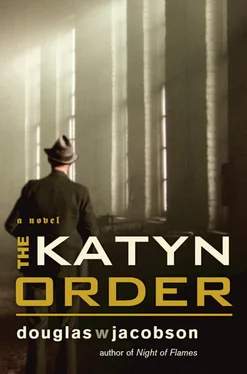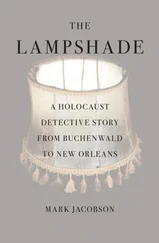Adam climbed the stairway, turned right and entered the Reading Room—a large, brightly lit area with windows along one side. About a dozen people were scattered about, sitting quietly at sturdy oak tables, studying books and documents. At the far end of the room a woman in a somber gray dress and a middle-aged man wearing a neatly pressed white shirt and tie sat a few meters apart behind a counter, sorting books and making notations on small cards. Adam set his briefcase on an empty table, took his time opening it and rummaged around until the woman picked up a pile of books and disappeared into the stacks behind the counter.
As Adam approached, the slender man glanced up and peered over the top of his glasses. The man’s face was familiar: thin, white hair, his skin soft and pale, the look of someone who spent most of his time indoors. His name tag read J. Jastremski.
“I’m looking for some records of iron ore production in Silesia,” Adam said.
Jerzy Jastremski was silent for a moment, appearing thoughtful, rotating a pencil between his thumb and forefinger as though he was envisioning the exact book and its precise location. Then he nodded and said, “Yes, I think I know where that might be. What period are you interested in?”
“The 1930s,” Adam replied.
Jastremski got to his feet and wandered off into the stacks. He returned several minutes later carrying a thick leather volume under his arm. He set the book on the counter and turned to the table of contents.
Adam glanced around. The woman librarian hadn’t returned, and everyone else in the room seemed engrossed in their reading.
After a moment Jastremski flipped through the book and said with a note of triumph, “Ah, here it is. I think you’ll find what you’re looking for on pages 1142 through 1156.”
Adam turned the book toward himself and glanced at the pages of dense data. “That looks like what I need.”
“Is there anything else I can help you with?” Jastremski asked.
“There is one other thing,” Adam said, casually. “I’m new in town and I’m thinking of attending mass this Sunday at the Church of Archangel Michael and Saint Stanislaus. Do you know the time?”
Jastremski stared at him for a moment, a flicker of recognition suddenly appearing in his eyes. His face flushed, and there was a slight tremor in his hands as he withdrew a thin notebook and fountain pen from his suit coat pocket. “There is more than one mass,” he said. “I’ll write down the times for you.” He scribbled a note and handed it to Adam with a barely perceptible motion of his head toward a door at the far end of the counter.
Adam glanced at the note.
Lower Level, Room L-3, thirty minutes.
Adam spent the next half hour staring at charts and tables of iron ore production, occasionally scribbling meaningless notes on a pad of paper. He glanced at his watch and looked up at the counter. Jastremski was gone, and the woman librarian was stamping cards and slipping them back into books. He waited a few moments until she picked up the books and left the counter. Then he snapped the briefcase shut, stood up and walked casually to the front of the room. He set the thick book on the counter and proceeded through the door at the far end. He descended the stairs to the Lower Level, found Room L3 and stepped inside.
Jastremski sat at a table and motioned for Adam to close the door.
Adam took a seat across the table from Jastremski. “You remember me, don’t you?”
Jastremski nodded, his pale complexion now ashen, as though he’d seen a ghost. “The Germans deported you… after they arrested…” His voice trailed off, and he lowered his eyes.
“It is important that I find my uncle,” Adam said, deciding it would be easiest to come right to the point. “I understand you know where he is.”
Jastremski didn’t respond.
Adam forced himself to be patient. “Will you help me?”
“These are dangerous times,” Jastremski said, folding his hands on the table. His fingers were long and thin. They trembled again as they had out in the Reading Room. “One must be cautious.”
“I understand.”
“Do you? Do you know that the NKVD has been kicking in doors all over the country since the murders near Zyrardow.”
“What murders?” Adam asked sharply.
“Three weeks ago two NKVD officers were murdered in some village out by the Bolimowski Forest. Near Zyrardow. One of them was a high-ranking officer. He was making an inspection tour of the rural areas. He was shot through the mouth, I heard. Sounds like an execution, if you ask me.”
Adam’s spine tingled. Having the NKVD on heightened alert was a problem, but it really had nothing to do with him. Stay focused. Concentrate on the mission. He looked Jastremski in the eyes. “Everything you tell me will be kept—”
Jastremski smiled thinly and leaned over the table. He had clearly recovered from the shock of seeing Adam again after all this time. “Save the speech. I’ve heard it all before. As I said, these are dangerous times. Don’t make promises you won’t be able to keep if you wind up in the hands of the NKVD.”
“OK, no speeches, no promises. But the fact remains that it is vitally important to find Ludwik Banach. Will you help me?”
“As I said, one must be cautious. I’ll tell you what I know, then we’ll see if it helps you.” He paused for a second as though gathering his thoughts, then moved his gaze to the bare walls. “This room was used as a storeroom by Hans Frank’s government. They kept all manner of records and documents here, in file boxes, all neatly organized and labeled: concentration camp details, extermination methods, starvation data.” He looked down at the table, shaking his head slowly. A moment later he continued. “In the fall of 1941, Banach obtained access to this room. I was never certain how, but I suspected that the German library director, Gustav Kruger, gave him a key.”
Adam flinched. A German gave Uncle Ludwik a key to the room?
“They weren’t all monsters, you know.”
“I’m afraid I only met the monsters.”
There was a look of understanding in Jastremski’s eyes. “Once every few weeks, Banach brought documents to me, and I took them to the church.”
“And the priest passed them on?” Adam was determined not to mention Natalia.
“I assume so. I never knew who actually received them. I just took them to the church and gave them to the priest. Everything flowed through him. Then in January of this year, immediately after the Germans fled the city, Banach decided to leave Krakow. He said he couldn’t be here when the Russians came. But he wasn’t well, and I urged him to stay here. We have doctors here. He could get treatment.”
“Not well? What do you mean?”
“His time in Sachsenhausen had been hard on him. He had a cough, and his energy was slipping. The Nazis allowed those of us working in the library access to doctors, but Banach refused to go.”
“Why?” Adam asked, though he’d already guessed the answer.
“He believed he had tuberculosis, and if he sought medical attention he would be sent to a sanatorium. He was very determined to leave Krakow, almost desperate. He kept saying he could not allow himself to be caught by the Russians.”
Adam thought it over as the pieces started falling into place. Banach had the copy of Stalin’s Katyn Order in his possession, but he knew he would be trapped in Krakow after the Russians arrived, especially if he were confined to a sanatorium. He also knew that Hans Frank’s “visitor” would return, searching for the order. “Where did he go?” Adam asked.
“There is an AK contact among the Górale,” Jastremski said, “in the Tatra Mountains, beyond Nowy Targ.”
Читать дальше












